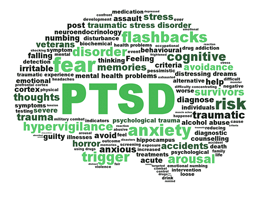
It was once considered a taboo subject, but today post-traumatic stress disorder (PTSD) has taken on a different light, thanks in large part to workshops like the one Jasper Victim Services will be hosting this week.
“It’s a very public topic right now. People are talking a lot about it and we want to let the community know that PTSD is being taken seriously,” Schmidt said.
Wyoming psychologist Pamela Fuller will be in town Nov. 4, providing a full day of PTSD training. The course will cover an array of topics including a scientific breakdown of what PTSD actually is and how to help someone living with the disorder.
“We’ll talk about the effects on the brain and the body and we’ll put quite a bit of attention on treatment strategies. More people are affected by PTSD than we realize,” Fuller said. “It’s also important as someone who is helping someone with PTSD that you’re not putting secondary stress on yourself—we’ll talk a little about that.”
According to the Canadian Mental Health Society, PTSD is a mental illness, which involves exposure to trauma involving death or the threat of death, serious injury or sexual violence.
PTSD causes intrusive symptoms such as re-experiencing the traumatic event. Many people have vivid nightmares and flashbacks. They often avoid things that remind them of the event.
PTSD can make people feel nervous all the time. Many are easily startled, have a hard time concentrating, feel irritable or have problems sleeping well. Some people feel numb and detached. They may feel like things around them aren’t real, feel disconnected from their body or thoughts or have a hard time feeling emotions.
“With this training, an important thing is teaching people what to say. A lot of people have that instinct to say that everything is going to be okay, but that’s not really a promise we can make,” Schmidt said. “You have to make sure you’re saying things that are supportive, but not incorrect.”
Other options for treating PTSD involve counseling, medication and support groups.
While the course is open to the public, Fuller and Schmidt said it will be targeted towards the region’s first responders.
According to the mental health society some occupations like military personnel, first responders, doctors and nurses experience higher rates of PTSD than other professions.
In Canada, 44 first responders and 10 military members have died by suicide so far this year, according to the Tema Conter Memorial Trust, a Canadian organization for military personnel dealing with mental health injuries.
A recent report in Montreal’s La Presse newspaper took a further look into the problem. It found that about 1,500 active members and 2,500 retired members of the Royal Canadian Mounted
Police are receiving some form of disability benefit to treat PTSD.
According to federal government documents obtained by La Presse, PTSD cases involving the RCMP have tripled since 2008.
In October, an all-party committee of MPs urged the federal government to take action on behalf of first responders who develop mental health issues after experiencing traumatic events.
In a unanimous report, the House of Commons public safety committee recommended the federal government come up with a national strategy for PTSD and operational stress injuries.
“In recent years we’ve made a lot of progress and more people are willing to speak out with their experience and seek education,” said Fuller, adding that educating yourself about PTSD is another way to help end the stigma surrounding the illness.
“We need to see more of this happen and continue educating people. We often talk about veterans and first responders, but most people aren’t aware that the highest rates of PTSD are the people who have been abused—children and women who have survived sexual assault and domestic violence.”
Along with the PTSD training course, Fuller will also offer a two-day crisis intervention course, Nov. 5 and 6. This course is designed to teach participants the fundamentals and specific protocols for individual crisis intervention.
According to Schmidt, about 30 people have signed up for both courses, but last minute additions are welcome.
For more information contact Jasper Victim Services at 780-852-2275.
Kayla Byrne
[email protected]
